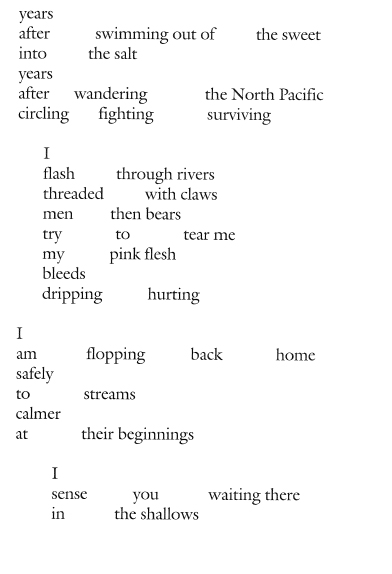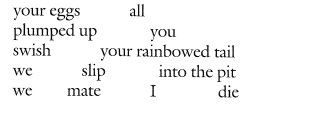
The mist blushes,
Then curtsies to a sun
That climbs over and commands
These hills frosted with bird calls.
There is a smell this morning of
Chekhov’s The Cherry Orchard.
See,
There Ranevskaya and Trofimoff,
Rocking back and forth
On the plains of their lives,
Palms open,
Unwilling to listen as the old order changes
And unable to stop the sale of their heritage.
Or, across the planet,
The set of Gone with the Wind.
Cocky young men gallop up to
Tara, pushing aside nests
Of magnolia mossed on their faces,
Hot to drink mint juleps three centuries old.
Or, if you prefer,
Peach blossoms dripping on Rhett Butler,
Laughing on his magnificent
Black stallion; yes, dark, grinning
Rhett Butler pouring sweet songs
Through his mustache and owled smile.
He gives a damn.
He imagines Scarlett chattering
With her suitors. But she is not
Penelope, nor is he Odysseus.
How perceptive
And almost imperious you are to have
So much of these places in you! And
Your clothes, so crisp and fresh
Like the earth under your feet.
You have
Hung up your rector’s collar and dance
Pink waltzes, sweat satin gavottes,
Or jump into blackened boots, down
On your haunches, doing the kazotsky.
Go anywhere with your passport of
Green optimism, Raleigh carrying
Scented letters from Elizabeth
On your heart of whispers.
Your rapier need never be used.
You have your royal commission!
You love this path of swollen leaves
Fused with all your remembrances.
It leads up and down through old Stuart
And Tudor lacework villages. Cobblestones
Echo horseshoes prancing around
The square. Well water glistens sweet and pure.
Apple pies cool on window ledges
For lovers who will traffic with
Bodiced and bonneted maidens gossiping inside.
Keep on going,
Dreamer, around to the bells of this
Church tower, gothic and pointed,
Like your purpose. Engrave a prayer
Skipped out of France on your way back
From the Crusades.
Yes! I do know you!
We have spilled portions on stories we have
Digested, tales caked in the mud of travels,
Epics washed in the salt of Malta.
Our ship skated across Styx and Cocytus
On winds poured into jeweled goblets,
Winds of red wine that tasted
Like blood, but we did not know the difference.
Take off your dented
Armor, sit a while. There’s a cardinal
With a message: his wife hides from us!
She was warned against the Cossacks,
Against the graycoats and bluecoats
Of Gettysburg. She is Russian and runs
From the Cossacks. She gathers her children
And. gambles on America. They will lose
Their hoarseness, learn how numbers will
Carry them to the moon. They will find
All the bright places in their myths
And walk the rails laid down by the Italians
And Chinese and Irish somewhere between
Springfield and Denver.
Yes, your grandmother
Was Russian and a believer. Now we can
Improvise angles that complement
And buy rectangles we will build into a house.
We will plan errors because we have not
Traveled. What? All right,
One last story:
Your helmet and goggles intrigue me,
Even though your jodhpurs are torn.
Yes, I know what happened after
You crashed in the jungle, searching for
Beauty. Christopher Caldwell died in Spain.
You survived your unconscious, but then
You always do.
This morning is bright and enters
Without nightmares.
Go! Be what you want. You have
What you need. Run or walk
But don’t beg. Never beg for a ride.
Travel on your own.
The sun prints
contours and edges,
defining trees,
houses, cars, people;
the shadows create
memories from a life
I may have
borrowed, an accident
that now includes me.
The wind stacks
leaves in corners,
later puffs snow around
plants, like feathers
quilted for winter
sleep; shadows
disappear then appear,
soundless gusts
from an insistent sun.
I am
spawned by
sun and wind;
each night
when day sleeps,
I dream
of a white hawk
who
dreams of me.
And finally
you arrived,
breathless,
after waiting
for months
in the wet warmth,
becoming you
inside your mother.
And then
you cried,
that first breath
pushed through
vocal chords
you learned
could be used
from then on.
We heard you,
Rachel,
mother first,
through tears
that were the first thing
she offered you,
tears she had been saving
and didn’t know
were there,
tears
that made her milk flow,
milk
that will bond you
together as in
no other way.
And then
when she held you,
you stopped crying
because you knew
she would be yours
from then on.
And I cried too,
because already
I loved you
even though
we had just met.
I didn’t
know who
you would be,
Rachel;
I waited a long time
for you,
and it was dark
where I was, too.


Night has shut off the light.
The crickets are my eyes.
They tell me the tales
They would have me know,
Of shining knights
On horse by the road,
Silk scarves tied
Tight to lances.
Of fiery dragons,
Nicely groomed,
All green and smiling,
Breath smoky sweet,
Who loved the knights
Who killed the dragons.
If you listen carefully
The crickets always stop talking
At the sound
Of approaching horses.
Some say
The crickets see
The knights.
That may be.
But they don’t see
The dragons anymore.
“...and one of them, on seeing
Death, runs away to Samarra.
‘That's strange/Death says
to the other, 'that's where
I have an appointment to meet with her?' "
I
She hears the wind
Pour through the oaks,
How it organizes the branches,
Stirring the leaves that make
A confusion of small sounds
Against each other.
I must tell her
The treetops sway in sections
Like undulating ballet dancers
Moving in waves.
She nods and muses quietly,
“Yes, of course”
I must tell her
Of the ravens
That took her eyes,
That fly soundlessly,
One by one
To the bird feeder,
Taking turns with blue jays and cardinals,
Offering colors
She has not seen
Since she was three.
II
And a storm follows.
She runs wildly,
Trying to escape
Each clap of thunder,
Unsure where the lightning
Will strike.
She bangs into brush and
Trips over stones.
I call out to guide her
But she cannot tell
Where things are
In the darkness.
III
Sometimes she feels
My mouth and face
With her fingers.
She can tell me what I see
When I have not even noticed.
She knows more quickly
When the sun flames softly,
But not where It casts
Deep tones on an aging afternoon.
At night I whisper that
She loves more fully than I do,
That less Is often more.
She smiles and tells me, yes,
She hears and smells and tastes better,
But that she would trade It all
For twenty minutes
In front of my mirror.
The beach is a vigilant guardian,
Great arms spread out, protecting all behind.
November sits on the sand, taking its turn.
The people have returned to the mainland.
The ocean is chafed by the wind and
Bares an angry face of white waves.
A handful of gulls are bounced around
So much they finally jump up and leave.
A small trawler plows a section off
The sand bar, dragging for blues and weaks.
Sometimes it drops into farmer furrows, the rigging
Appears like broken crosses on a battlefield.
White-necked scoters fly low and fast, oblivious
To the wind that is ceaseless, that pushes
The water out of the sea up onto the beach.
It does until the November moon, no longer
Amused by the wind, pulls the water back
Down into the sea, back off the beach that’s
Left only with marks and remnants
Like a lover who has come and gone.
Hey, listen: you can hear them, can’t you?
There, around the corner,
those seven sounds scrambling
in the dank mustiness
of Preservation Hall.
Here, get a little closer.
That horn is Percy Humphrey’s
love, and
notes stand up,
at different heights,
like choir boys
marching with shiny icons.
The melody oozes,
fingers tap on tabletops,
bodies sway, controlled by the rhythm.
Well, they’ve finished
“Beak Street Blues.”
It hangs in the smoke,
then blends into laughter and
noises from chairs scratching
against the tilted floor.
Waiters hover like birds,
asking for drink orders before the next set.
They start again,
slowly at first,
the music shimmering like that “sexy” dancer
across the street,
who rolls her shoulders and then her hips.
Sweet Emma takes another last sip,
slides to the mike;
“… don’t the moon look lonesome
shining through the trees?
Don’t a man seem lonesome
when his woman packs to leave?"
New Orleans bards and balladeers,
hear the cries of the Quarter.
And years earlier,
of cotton and whips,
run and hide.
Now it’s all newly painted
even though some buildings
only have fronts:
nothing is permitted to spoil
the Mardi Gras.
But he’s there,
around the corner,
legless,
begging on his skateboard.
He’s still there.
Waiting.
The moon is fully turned on over
Fort Huachuca. On a distant ridge
A coyote yaps and whines his serenade
To an audience of barrel cacti.
The scooped-out valley south to Naco
Looks like the Copernicus Crater,
Scarred with faults and bouldered rubble.
Tonight Bisbee must be an erupting
Volcano of beer. The copper miners are
Rolling in the lava, its froth washing
The dank and grime from their eyes.
In this last hour before taps,
The all-black cavalry battalion
Repolishes its boots for the Colonel’s
Weekly Review on the parade grounds.
Ernesto lies against a very old fig tree,
Dreaming a cowboy’s dream of Nogales’ whores
With perfumed smiles and swooshing skirts.
Soon he mounts his horse, heading west
Up into Carr Canyon where that lost
Calf might be. And the coyote leaves
The ridge, following a faint scent.
“I am Gray Fox. I live and fish
the Nisqually and the Yakima.
“My grandfather told me of Rainier,
“Mountain that was God’ land pushed
so high men would see her forever.
“My grandfather told me when the rains stop and
it is clear, I will see her haloed head poking
through quilted blankets of clouds.
“I will see her shoulders are the bulging
muscles of her blue-iced glaciers.
I will see her spines rise like the dinosaur’s into
“Rocky spires that punch through fields
of fractured snow. Her cheeks are craggy
With cracked calluses. I have stood on her
bouldered chins, trying to understand.
Grandfather told me the tales of how she has been
burned by centuries of the Sun’s gas-fired breath.
“It is good when she is calm and pleased
with us; then there are many salmon.”